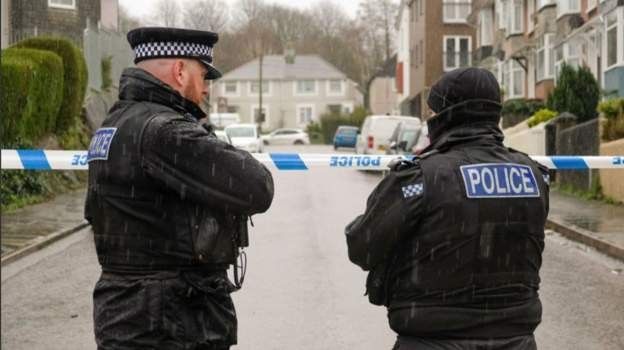
Plymouth City Council said 1,219 properties had been evacuated and an estimated 3,250 people displaced
By Chloe Parkman & Chris Ellis
BBC News
Thousands of people have been displaced after an unexploded World War Two bomb was found in Plymouth, the city council has said.
From 09:00 GMT on Thursday the exclusion zone was widened from 200m (656ft) to 309m (1,014ft) in the Keyham area of the city.
The bomb was found in a garden on St Michael Avenue on Tuesday, police said.
Plymouth City Council said 1,219 properties had been evacuated and an estimated 3,250 people displaced.
Image source, PA Media
The bomb at the centre of the cordon is a 500kg (1,102lb) German bomb
The council said bomb disposal experts were still assessing the device to determine the best possible approach and “it is a very complex situation”.
Jordan Grimshaw, who is a resident inside the cordon, said it had been “one mad rush” since the bomb was found.
“It’s been manic – loads of police everywhere, left, right and centre,” he said.
“You don’t know what’s going to happen next.”
Jordan Grimshaw works at Betfred on Henderson Place in Ford
‘Nowhere else to go’
Another resident – who owns three dogs with his partner – said they would go “away for the weekend” as they had nowhere else to go.
Michael Wheeler said: “They’ve put our house in the cordon overnight…
“We’ve been left in limbo really, what are we meant to do? No hotels are going to take us [with the dogs].”
On Wednesday the council advised evacuated residents to “please make arrangements for your pets to stay with friends and family”.
The Life Centre leisure centre is being used as an emergency rest centre for people who have been evacuated.
The bomb at the centre of the cordon is a 500kg (1,102lb) German bomb from World War Two, a Ministry of Defence spokesperson said.
‘People kept safe’
Councillor Sally Haydon, cabinet member for Community Safety, Libraries, Cemeteries and Crematoria, said the priority was “to make sure that people are looked after and are kept safe”.
Insp Paul Laity, neighbourhood inspector for Devonport and the west of the city, said: “Decisions are still being made by the Explosive Ordnance Disposal as to how they’re going to deal with the incident and I guess that will be tomorrow [Friday] at some point.”
He said officers were not at this stage forcing people living inside the cordon zone to leave their properties.
He said emergency services were advising anyone who wanted to stay of the risks, but they could stay if they wished.
Image source, Plymouth City Council
The Life Centre leisure centre is being used as an emergency rest centre for people who have been evacuated
Insp Laity said: “There are a number of people who want to remain in their homes and we completely understand and sympathise with them.
“There are various reasons why they don’t want to leave – it could be care needs etc – and we do our best to map that out so we know where they are, and to accommodate any support services that they need along with our partners.”
Insp Laity said he did not have an exact number for how many residents were still inside the cordon, but added the number was believed to be “minimal”.
Police declared a major incident following the discovery on Tuesday
Plymouth was heavily bombed during the war in an attempt to damage nearby naval facilities.
Related Topics
Related Internet Links
The BBC is not responsible for the content of external sites.








